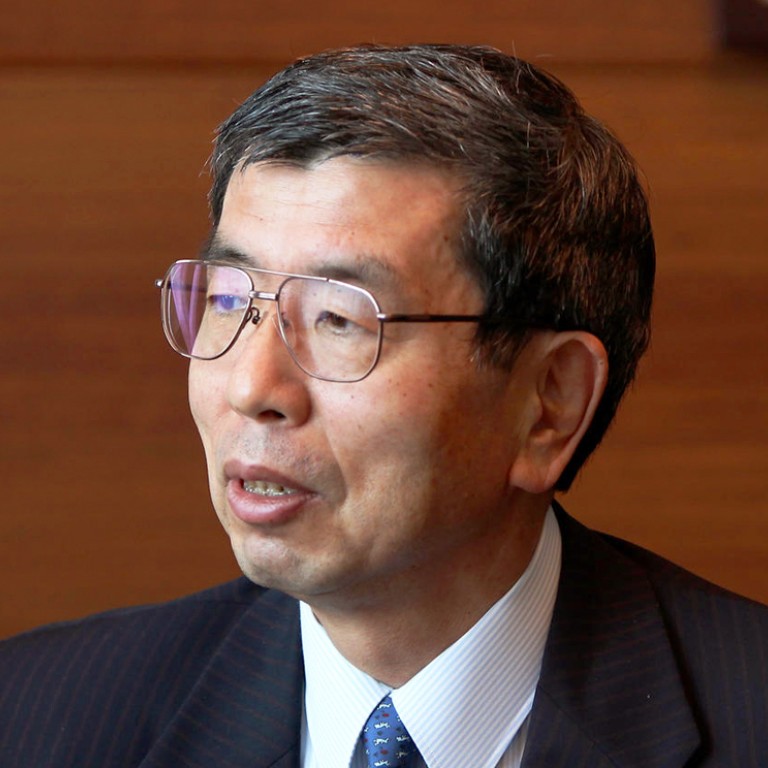
China has the fiscal means to fight slowdown, says ADB president
President of Asian Development Bank says vast fiscal resources can be used by mainland, as he calls for sustainable solution to HK protests
The mainland can tap its healthy fiscal resources to reverse any economic growth slump as needed, Asian Development Bank (ADB) president Takehiko Nakao said in Beijing yesterday, while also calling for a "sustainable solution" to protests in Hong Kong.

"Compared to other regions like the Middle East, Africa, Europe or Russia, Asia has been more stable geopolitically and politically," Nakao said and should "try hard" to stay so.
Asked whether a failure to resolve the protests in Hong Kong might hurt its stability, he said: "Of course, if it incurs more confusion and trouble, it would have a negative impact on the Hong Kong economy in the short term.
"We need a sustainable solution to the Hong Kong issue," he said, without elaborating.
The ADB slashed its economic growth forecast for Hong Kong by a percentage point to 2.5 per cent late last month, before the Occupy Central protests began, citing weaker retail and tourism performance.
Nakao said he did not think the US$50 billion Asian Infrastructure Investment Bank (AIIB) - mostly funded by Beijing - to be launched today, was a threat to the ADB's regional role.
"Asia has a very large need for financing and investment," he said. "The ADB has been playing a very important role. Chinese authorities have repeatedly been saying AIIB is not going to compete with the ADB but complement it. I hope to have good cooperation with the new bank."
The mainland's gross domestic product grew by 7.3 per cent year on year in the third quarter, the slowest pace since early 2009, cooling from 7.5 per cent growth in the first half and 7.7 per cent for the whole of last year.
But Nakao said that was still "very high and I think China can continue that level of growth if it pursues good policies". Finance Minister Lou Jiwei said on Tuesday that the slowing growth was within the forecast range.
As industrial activity has slowed, Beijing has taken measures to support growth, including adding short-term funding to selected banks and relaxing limits on mortgage loans. Local governments have accelerated infrastructure investment.
Nakao, a former deputy finance minister in Japan, said mainland China should boost productivity and not rely on expansionary fiscal and monetary policies. However, there was room for Beijing to adopt fiscal stimulus to stem any sharp growth slowdown, he said.
"We need a balance. We can't just let the macro-economy slow down too much," he said. "So in those cases the government has room to stimulate the economy with some measures.
"The fiscal balance is healthy and the debt-to-GDP ratio is still very low."
The mainland's central and local government debt adds up to less than 60 per cent of GDP, far lower than the 200 per cent ratio in Japan and the more than 100 per cent in most developed nations, according to Citigroup economist Ding Shuang.
Nakao said the ADB had been working closely with the National Development and Reform Commission on the drafting of the mainland's 13th five-year plan - for 2016-2020 - in areas including policies on market-led industrial transformation, balancing rural-urban development and modernising public finance.
State-owned enterprise reform was crucial, he said, while adding that Beijing should not rush to privatise them.
"Privatisation is one way. But we don't need to rush to privatisation, because it means it would sell equity in a very underpriced way," he said. "So there would be a concentration of equity holding by a small number of rich people. It is not a very good way."
He said he also hoped geopolitical issues, such as territorial disputes between China and Japan, would not hurt economic development in Asia.
"Asia should continue to enjoy prosperity," he said. "We shouldn't damage the progress so far with any tension."

